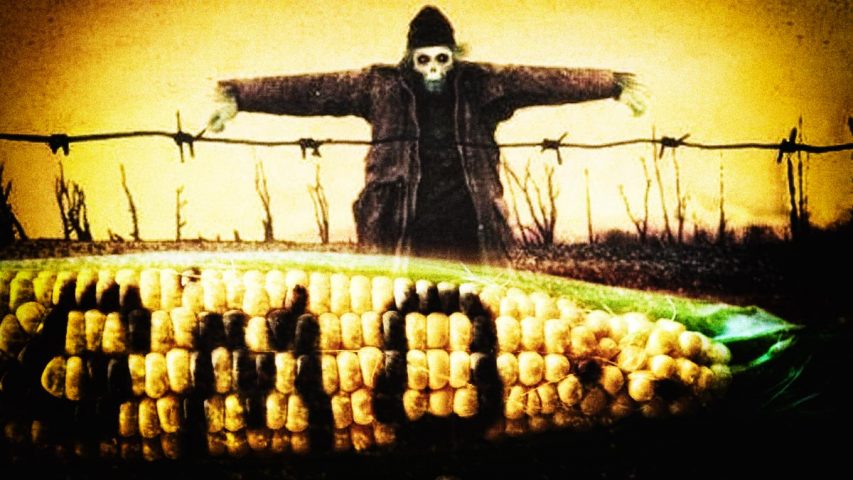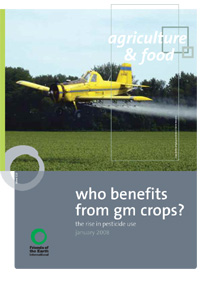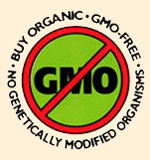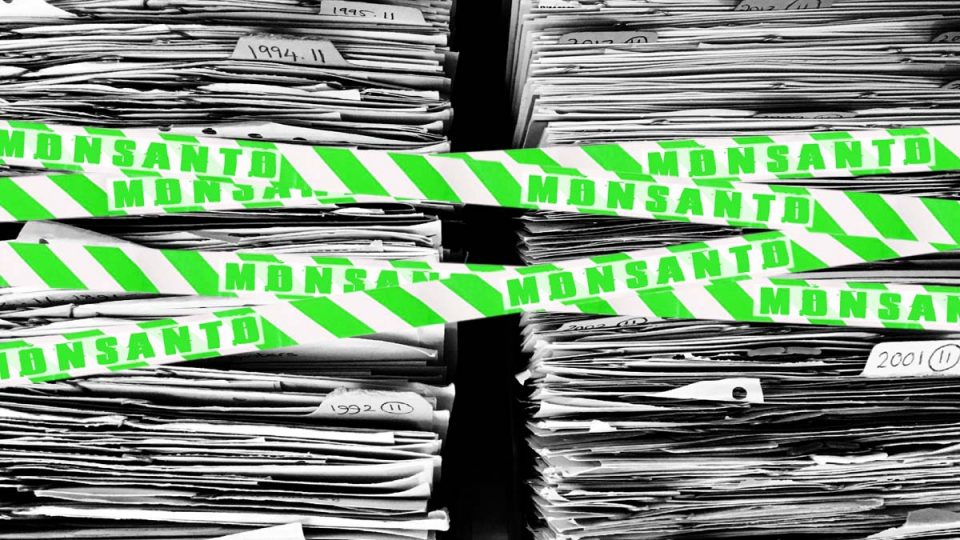- Have any questions? Contact us!
- info@dr-rath-foundation.org

Oil and Drug Cartel Plans “Global Coup” through IMF
November 13, 2008
The roots of the “Brussels EU”
January 15, 20092008: A Bad Year for the GM Multinationals

Looking back over the past 12 months, there can be very little doubt that, from the perspective of the large multinational producers of genetically modified (GM) seeds and food, 2008 was a very bad year indeed. Far from moving closer towards the GM industry’s cherished dream of seeing foods grown from patented GM seeds becoming the norm on our dinner plates, it would seem that consumers are, if anything, becoming more suspicious than ever regarding these products.
A gigantic experiment with nature and the whole of humanity which has gone seriously wrong
As such, with reports of the dangers of GM food becoming more common almost by the week, and even Prince Charles – the heir to the British throne – now openly stating that the widespread use of GM crops would be the biggest environmental disaster of all time, it is no longer too difficult to envisage a future where the consumption of naturally-grown organic foods, rather than GM foods, might become the norm. So, as we head into 2009, let’s take a look back at some of the key reasons why the GM food industry’s senior executives and shareholders may be looking with increasing trepidation at the year ahead.
More countries imposing bans on GM crops

During 2008, a number of additional countries began imposing bans and restrictions on the cultivation of GM crops.
France, for example, banned a strain of GM maize produced by the US agribusiness giant Monsanto, delighting environmentalists but sparking outrage from the company – especially so given that the strain concerned, MON 810, is already the only GM crop permitted to be cultivated in the European Union. The ban followed a French government-appointed committee stating that it had “serious doubts” about the product.
Moreover, whilst European Union regulators launched legal action against Poland early in 2008, in an attempt to force it to lift its GM ban, the Polish government subsequently declared that Poland will be remaining GM-free – thus continuing its ongoing policy of hampering the planting of GM crops.
Greece, meanwhile, announced in April that it was renewing its ban on GM maize produced by Monsanto and expanding it to include 70 types of seed. Citing potential threats to human health and the beekeeping industry, the Greek Agriculture Minister Alexandros Kondos said that Greece’s three-year-old ban on the sale and cultivation of MON 810 seeds was to be extended for two more years.
Across in the UK, tough proposals announced by the Welsh Assembly Government will effectively ban GM crops from being cultivated in Wales, and, if adopted, will also put an end to trial plantings. In a move supported by a number of environmental groups and farming interests, the Welsh proposals will make both GM companies and the farmers who plant their crops legally liable for any contamination that occurs.

In keynote speeches at a conference on food and farming policy in September 2008, the Republic of Ireland’s Minister of State for Food and Horticulture, Trevor Sargent TD (l), and the Northern Ireland Minister for Agriculture and Rural Affairs, Michelle Gildernew MP (r), called for the entire island of Ireland to be declared off-limits to the release of GM crops.
On the island of Ireland, agriculture ministers from both the Republic of Ireland and Northern Ireland recently confirmed their plans for the island to be declared a GM-free zone. In keynote speeches at a conference on food and farming policy in September, the Irish Minister of State for Food and Horticulture, Trevor Sargent TD, and the Northern Ireland Minister for Agriculture and Rural Affairs, Michelle Gildernew MP, called for the island to be declared off-limits to the release of GM crops. Their statements followed similar calls by the Scottish Government, which is now planning to link up with its counterparts in Wales and Northern Ireland and is putting mounting pressure on the UK government to end its support for GM crops.
In Switzerland – which had already imposed a moratorium on the commercial cultivation of GM crops in 2005 – legislators voted to extend the ban until 2012. In doing so, the Swiss specifically stated that the freeze had benefited Swiss farmers, who were able to market their produce on international markets as GM-free.
Likewise, in Peru, the production of GM crops was also suspended in 2008, with the Peruvian Minister of the Environment, Antonio Brack, citing risks to health and biodiversity. Similar sentiments were expressed in Africa, with the Lusaka Province Minister, Lameck Mangani, stating that the Zambian government will not allow GM products into the country and that there is a need to continue protecting the country from the danger posed by them.
Further evidence of the dangers of GM crops
A discovery in Canada last year – that GM canola plants can interbreed with a weed, producing a hybrid wild mustard that is resistant to Monsanto’s flagship herbicide glyphosate (Roundup) – is similarly of concern. Despite the prior claims of GM crop producers that genetically engineered plants wouldn’t cross with weeds – and then, when they eventually did, that the new hybrids wouldn’t persist – the Canadian researchers found that a herbicide resistance gene from the GM canola had moved into the gene pool of a weedy relative and persisted during a six-year period.
And, in another alarming finding, scientists learned in 2008 that an insect that is supposed to be killed by a GM crop with an in-built toxin gene has developed resistance to it and started to spread in parts of the United States. The scientists who made this finding say that it may now only be a matter of time before other insects similarly adapt to this crop.
Meanwhile, a report jointly produced by the environmental activist organization Friends of the Earth International and the Center for Food Safety, a Washington D.C. advocacy group, examined the emergence of “superweeds” that have developed a resistance to conventional herbicides such as Monsanto’s Roundup. According to the report, the amount of herbicides used by farmers to kill weeds has had to rise an astonishing fifteenfold since biotech crops were first planted. Bill Freese, a policy analyst at the Center for Food Safety and a co-author of the report, described the fight against these superweeds as “a chemical arms race.”
In June, a report published by the US-based Institute for Responsible Technology drew together the findings from more than 100 research papers. Entitled “State-of-the-Science on the Health Risks of GM Foods,” it described the conflict of interest among regulators that allowed GM foods on the market; the wide range of adverse findings from animal feeding studies such as higher death rates, organ damage, reproductive failures, and infant mortality; reports by farmers of thousands of sick, sterile, and dead livestock; toxic and allergic properties of GM foods; numerous scientific assumptions used as the basis for safety claims that have since proven false; inadequate regulatory oversight; biased industry safety studies; manipulation of public opinion; and the mistreatment of scientists critical of the technology. In sharp contrast to the claims of those who disingenuously allege that there is a scientific consensus in favour of GM crops, the report’s contents prove that there are in fact a large number of research scientists who have serious concerns regarding the safety of these products.

A 2008 report jointly produced by the environmental activist organization Friends of the Earth International and the Center for Food Safety, a Washington D.C. advocacy group, examined the emergence of “superweeds” and found that the amount of herbicides used by farmers to kill weeds has had to rise an astonishing fifteenfold since biotech crops were first planted.
Claim that GM increases yields exposed as false

A major U.S. study published in 2008 found that GM soya produced by Monsanto actually produces 10 per cent less food than its conventional equivalent, thus undermining the oft-repeated claim that the use of GM technology is essential to solve the growing world food crisis.
Advocates of GM crops frequently claim that the yields from these products exceed those from regular crops.
However, a major U.S. study published in 2008 found that GM soya produced by Monsanto actually produces 10 per cent less food than its conventional equivalent, thus undermining the oft-repeated claim that the use of GM technology is essential to solve the growing world food crisis. Carried out over a three-year period at the University of Kansas, the study confirmed the findings of researchers from the University of Nebraska, who had previously found that another GM soya produced by Monsanto generated 6 per cent less food than its closest conventional relative, and 11 per cent less than the best non-GM soya available.
The findings of this study were echoed in a separate report, published by the UK’s Soil Association, which examined the latest available research on GM crop yields over the last ten years. In contrast to the widely trumpeted claims of GM companies that they have the answer to world hunger, the report showed that the yields of all major GM crop varieties in cultivation are lower than, or at best, equivalent to, yields from non-GM varieties.
Moreover, a 2008 draft report produced by the International Assessment of Agricultural Science and Technology project – an ambitious, 4-year, US$10-million undertaking involving 4,000 scientists and experts from around the world – raised still further serious concerns about the environmental, human health and economic impacts of GM crops. As well as stating that there is no evidence that GM crops increase yields, the report specifically warned that use of the technology in the developing world could concentrate “ownership of agricultural resources” in the hands of the companies involved and cause problems with patents. Significantly therefore, following the report’s failure to back GM as a tool to reduce poverty and hunger, the biotech companies Monsanto, Syngenta and BASF promptly withdrew from the project.
UK’s Prince Charles attacks GM crops, draws attention to the Indian ‘GM Genocide’
Interviewed in the UK’s Daily Telegraph newspaper in August, Prince Charles – the heir to the British throne – openly stated that the widespread use of GM crops would be the biggest environmental disaster of all time. Saying that multinational food companies were conducting a “gigantic experiment with nature and the whole of humanity which has gone seriously wrong,” he added that “excessive approaches to modern forms of agriculture” had damaged water supplies in India’s Punjab and in Western Australia.
Less than two months later, and subsequent to the blitz of media attacks on him that had inevitably followed his decision to draw attention to this issue, the Prince bravely went even further. In an address to an Indian audience, he spoke out about “the truly appalling and tragic rate of small farmer suicides in India, stemming in part from the failure of many GM crop varieties”.
Branded the ‘GM Genocide’ by campaigners, the suicides Prince Charles referred to are a result of Indian farmers being promised radically increased harvests and income if they switch from using traditional non-GM seeds to planting GM seeds instead. To buy the GM seeds – which are dramatically more expensive than regular seeds – the farmers typically borrow the necessary money, often from local money-lenders to whom they become massively in debt.
However, because the GM seeds can require double the amount of water compared to non-GM seeds, unpredictable changes in weather patterns and changing climates can easily destroy the resulting crops. And, when that happens, because the crops’ seeds contain so-called terminator genes, they cannot be replanted the following year – thus meaning that the farmers have to buy new ones. Add in the fact that supposedly pest-proof GM varieties of cotton have been devastated by the bollworm parasite and it becomes easy to see why more than 150,000 Indian farmers are now estimated to have committed suicide since 1997 after their GM crops failed and their debts reached unmanageable proportions.

Prince Charles – the heir to the British throne – said in 2008 that multinational food companies are conducting a “gigantic experiment with nature and the whole of humanity which has gone seriously wrong.”
The “beginning of the end” for GM foods?

A new “non-GM” labelling initiative to be launched this year is already being cited by some as the “beginning of the end” for GM foods. Backed by more than 400 American processors and retailers, about 28,000 products will be labelled as “non-GM” by the companies, which have a combined worth of $12bn.
Arguably the most crucial battleground of all regarding GM foods at the present time concerns the issue of labelling. In short, the large multinational GM seed and food producers don’t want their products to be labelled as having been genetically modified because, if they are, they know full well that the vast majority of consumers will simply avoid them.
Internationally, the labelling battle is largely being fought out at meetings of the Codex Committee on Food Labelling, where countries that are large-scale producers of GM seeds and foods are desperately fighting against global labelling standards that would make it mandatory for them to be labelled as containing GM ingredients.
Significantly therefore, in the United States, a new “non-GM” labelling initiative to be launched this year is already being cited by some as the “beginning of the end” for GM foods. Backed by more than 400 American processors and retailers, about 28,000 products will be labelled as “non-GM” by the companies, which have a combined worth of $12bn.
Should this initiative prove to be popular – and, given that consumers both in the United States and the world over are overwhelmingly opposed to eating GM foods, it probably will – there seems every likelihood that it will spread and be copied by other countries. If this happens, the eventual collapse of the international market for GM seeds and foods – and with it, an end to the dangerous folly of putting patented seeds and crops before the health of people and the welfare of the environment – could soon be in sight.
As such, with scientific evidence now calling into question the very principles on which the GM industry was founded – and even some industry representatives beginning to admit that the human genome is so enormously complex that the only thing we can say about it with certainty is how much more we have left to learn – one thing’s for sure in that 2009 seems unlikely to bring better tidings for what is rapidly turning into one of the world’s most unpopular industries.


